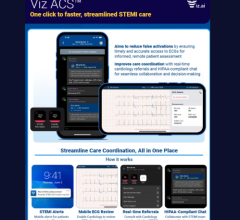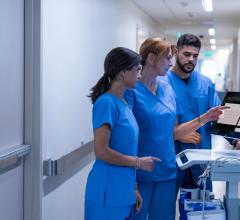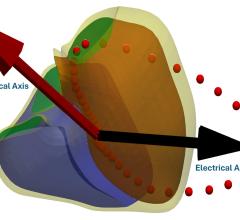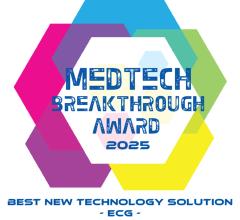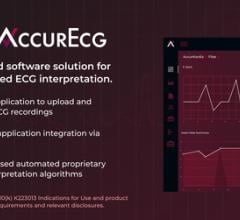
November 14, 2011 — Everist Genomics announced plans to commercialize its CardioDefender diagnostic system. It is the first U.S. Food and Drug Administration (FDA)-approved and CE mark-registered smartphone echocardiogram (ECG) system to provide hospital-quality heart rhythm monitoring outside of the hospital setting. The system incorporates several capabilities enabling physicians to diagnose and treat potentially life-threatening arrhythmias that might otherwise be missed.
CardioDefender is the first system to deliver mobile, real-time, beat-by-beat, and quantitative heart monitoring and automated reporting by combining patented analytical smartphone software with a Bluetooth device and electrodes. The electrodes—which are attached to the patient's skin—transmit heart rhythm data to the Bluetooth device, which then transmits it to the smartphone. The software analyzes the data, which data is sent to a cardiac monitoring center; the center keeps an encrypted record of the data that can be reviewed by physicians.
Physicians are also able to receive arrhythmia alerts via their smartphone, tablet, laptop or desktop computer. In the event of a significant arrhythmia, the system will automatically transmit an alert to the patient's physician while the event is occurring.
The Joint Committee of the American Heart Association/American College of Cardiology (AHA/ACC) recommends everyone over 40 years of age should be examined for potential heart arrhythmias. In the United States alone, more than 4 million people a year suffer from recurrent arrhythmias warranting a physician's care. About 780,000 people are admitted to the hospital for arrhythmias annually.
Arrhythmias are a very common event—almost everyone occasionally experiences minor arrhythmias that don't require medical attention. In contrast to these benign cases, however, some arrhythmias result in sudden cardiac death (SCD). In fact, most cases of SCD are caused by a specific type of arrhythmia known as ventricular fibrillation.
Ventricular fibrillation accounts for 75-80 percent of all SCDs in the United States. This type of arrhythmia also is often the first expression of coronary artery disease (CAD). It is responsible for approximately 50 percent of deaths from CAD, often within the first hour after the onset of a heart attack or coronary syndrome.
Identifying patients at risk of ventricular fibrillation remains a significant challenge. Although research shows the risk of ventricular fibrillation is greater among people with a history of cardiac events, only a small percentage of total ventricular fibrillation events actually occur in these patients. Identification of other types of heart arrhythmias also represents a major challenge as many arrhythmias occur without any signs or symptoms.
Conventional methods for monitoring and diagnosing arrhythmias have included hospital-based ECG systems, portable ECG recorders and Holter monitors, each of which present significant limitations. Hospital-based ECG monitoring, for example, typically limits the observation period to a few days, despite the fact people with intermittent arrhythmias rarely experience them at the hospital or doctor's office.
On the other hand, ECG recorders and Holters enable physicians to monitor patients' heart rhythm data remotely; such devices do not provide real-time, beat-by-beat, quantitative heart rhythm monitoring.
Moreover, portable ECG recorders and Holters are generally limited to less than 4 hours or 6 events of actual event recording time. Furthermore, these devices cannot simultaneously transmit heart rhythm data to monitoring centers while recording new data.
Following FDA approval and European CE Mark registration last year, CardioDefender has already been deployed at more than 150 medical facilities in the United States for post-approval commercial evaluation. Between January and October of this year, the number of patient days of heart rhythm monitoring performed with CardioDefender grew from fewer than 5,000 to more than 18,000 patient days per month.
This novel diagnostic system complements the AngioDefender diagnostic device for assessing endothelial function.
The company plans to make the CardioDefender system commercially available to international markets in January 2012.
For more information: www.everistgenomics.com

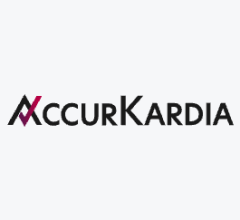
 January 15, 2026
January 15, 2026 


